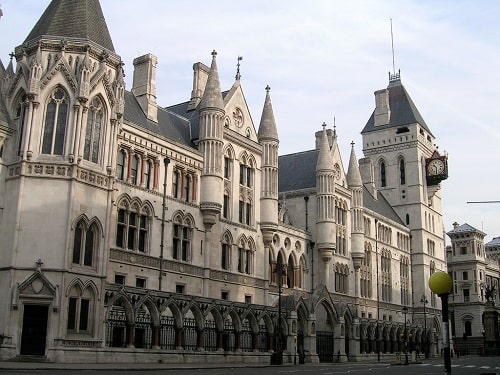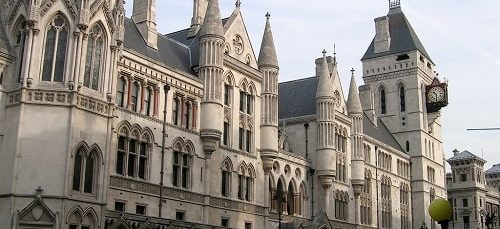Barrister for Government of United States of America asks for redactions (before disclosure to the press) to document during day 2 of UK (United Kingdom) High Court judicial review appeal hearing of earlier judicial decision not to extradite Julian Assange from the UK to America
By John Brace (Editor)
First publication date: 28th October 2021, 20:24 (BST, GMT+1).
Updated 29th October 2021 to add Kromberg declaration links

Please note that comments are turned off due to the ongoing nature of this case.
For the last 2 days (27th October 2021 and 28th October 2021) I have observed an appeal hearing
heard before the Lord Chief Justice (The Right Honourable The Lord Burnett of Maldon PC) and The Right Honourable Lord Justice Holroyde which is a judicial review from the earlier decision not to extradite Julian Assange from the United Kingdom of Great Britain and Northern Ireland (“UK”) to the United States of America (“US”). This earlier decision was made in the Westminster Magistrates’ Court by District Judge Vanessa Baraitser on 4th January 2021 (all 132 pages can be read on the Courts and Tribunal Judiciary website) by following this link.
This case number was CO/150/2021 (in the Royal Courts of Justice (Queen’s Bench Division)) and was held as a hybrid open public hearing, physically in Court 4 (with Court 1 as an overspill), but also on the Cloud Video Platform (CVP) which on day 1 included a video link to HMP (Her Majesty’s Prison) Belmarsh.
The Cloud Video Platform is an internet based video communications system for both remotely viewing hearings and also for two way communication.
The parties in the case are the Government of the United States (the Appellant) and Julian Paul Assange (the Respondent).
Day 1 mainly comprised of the arguments by a barrister representing the Government of the United States (from just after the start of day 1 at 10.30 am) setting out why he thought the appeal should be allowed by the judiciary, with around half an hour at the end for the barrister on behalf of Julian Assange to reply.
Day 2 followed the same timings as day one, but reversed, with the legal team for Julian Assange explaining why they thought the original judicial decision to not extradite should not be changed by this appeal (with around half an hour at the end for the barrister on behalf of the Government of the United States to reply).
For clarity, since the earlier decision in January 2021 not to extradite, Julian Assange has been kept in UK custody pending the outcome of this appeal, having served all of a previous 50 week sentence given in 2019 for breach of bail conditions (following his arrest at the Ecuadorian Embassy), but he has not been bailed pending the outcome of this appeal due to being deemed a flight risk following the earlier breach of bail conditions.
By way of some brief background to the reasons behind the US extradition request, as this a bit complicated I’ll set this out as a chronology (with the caveat that these are just allegations and have not yet been tested at trial):-
21.12.2017 – A US federal magistrate judge (in the Commonwealth of Virginia) charges Mr Assange with conspiracy contrary to Title 18 of the US Code (USC), section 371, with the underlying offence alleged to be the object of conspiracy being computer intrusion (Title 18 USC Section 1030).
6.3.2018 – A US federal grand jury decides on an indictment against Mr Assange charging him conspiracy (contrary to Title 18, USC section 371) to commit computer intrusion (alleged to be contrary to section 1030(a)(1) and (2). The US asks the UK for a provisional arrest request for this charge.
29.3.2019 – a US federal grand jury returns a superseding indictment with 18 counts alleging further offences and a warrant is issued for the arrest of Julian Assange by the US District Court for East Virginia for the arrest of Mr Assange, a request is made to the UK for extradition of Mr Assange. These are in relation to alleged offences related to obtaining, receiving and disclosure of “National Defense Information” (alleged to be contrary to Title 18, USC sections 793(g), 793(b), 793(c), 793(d) and 793(e). This was supported by an affidavit of Kellen Dwyer (an American cyber-crimes prosecutor) and again a request was made to the UK for extradition.
24.6.2020 – a federal grand jury in Alexandria, Virginia returns a second superseding indictment (also with 18 counts). A further request to the UK for extradition is made (but the initial earlier extradition request is later discharged). This is supported by five declarations of Gordon Kromberg dated 17.1.20 (“Kromberg first declaration”), 19.2.20 (“supplemental Kromberg declaration”), 12.3.20 (“second supplemental Kromberg declaration”), 24.3.20 (“fourth third supplemental Kromberg declaration”) and 17.3.20 (“fourth supplemental Kromberg declaration”). Mr Gordon Kromberg is the lead prosecutor (as far as I can tell an Assistant United States Attorney in the Eastern District of Virginia) and also a retired Lieutenant Colonel having previously served in the United States Army’s Judge Advocate General’s Corps.
Following the Court of Appeal decision in [2012] EWCA Civ 420, any evidence mentioned in an open UK judicial hearing below the Court of Appeal (therefore this decision is binding on these current proceedings) can be disclosed to the press (who can publish it connected to contemporaneous reports of hearings) and is considered to be a public document.
This arose because the Court Clerk had been asked to provide a document (connected in some way to Kromberg) mentioned at the open hearing on day 2, but one of the solicitors (presumably the side acting for the Government of the United States) had asked the same Court Clerk not to release it to the media.
After challenging questions put to the Court Clerk by the press over why such a request had been blocked, the Court Clerk agreed to refer the matter to the Lord Chief Justice but only at the end of the hearing on day 2 (the end was slightly delayed).
It was pointed out (before the hearing finished once he had been told) by the Lord Chief Justice that no application had been made to restrict disclosure of documents referred to at the hearing to the press (the open justice principle).
A barrister representing the Government of the United States (who initially appeared to agree with the barrister for the Julian Assange regarding disclosure), then insisted on checking verbally with someone else, after checking and receiving further instruction, completely reversed his verbal opinion given a few moments ago and explained that the reason for the Government of the United States side not disclosing the document was that because that party wanted to make some redactions to it first.
After some further comments made in response to this by the Lord Chief Justice the hearing for day 2 ended.
However, in a number of many other matters raised during the 2 day hearing, there was reference made to criminal proceedings in Spain involving a Spanish firm UC Global S.L. (it is alleged this done on behalf of the American CIA (Central Intelligence Agency)). Those involved in the Spanish firm are accused (amongst other things) of unlawful surveillance of Mr Julian Assange during his stay in the Ecuadorian Embassy in London, prior to his arrest at the Ecuadorian Embassy there by UK police officers in 2019. It is alleged that this surveillance included face to face meetings with his legal team at the Ecuadorian Embassy (meetings that would be considered usually private because of the concept of legal professional privilege).
The Swedish Prosecution Authority’s extradition request for Julian Assange’s extradition to Sweden (which had previously been argued all the way to the UK Supreme Court, see [2012] UKSC 22) was eventually discontinued in October 2019 (three of the Swedish allegations had earlier been dropped in 2015 due to a statute of limitations in Swedish law).
A number of documents were disclosed to the media during the 2 day judicial review hearing that are linked below in the interests of openness and transparency:-
1. Skeleton Arguments for Appellant (Government of the United States of America) (32 A4 pages)
2. Skeleton Arguments for Respondent (Julian Assange) (33 A4 pages)
Finally, as shortly after one of the previous times I mentioned the Government of the United States on this blog the US Federal Bureau of Investigation (FBI) seemed somewhat curious about me, I of course welcome any readers that might be reading this blog from the United States Intelligence Community. Please note the above is written (and makes a lot more sense to read in) British English, not American English, for example we write dates in the format DD.MM.YYYY whereas in American English you put it in a different order (the month before the day of month MM.DD.YYYY)).
If you click on any of the buttons below, you’ll be doing me a favour by sharing this article with other people.
